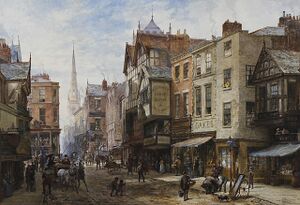Classical political economy: Difference between revisions
Jump to navigation
Jump to search
Harrystein (talk | contribs) m (CE; +{{navpolecon}}) |
Harrystein (talk | contribs) m (CE clarity) |
||
| Line 1: | Line 1: | ||
{{navpolecon}}{{stub}} | {{navpolecon}}{{stub}} | ||
'''Classical political economy''' is a school of thought in [[economics]] which was founded by [[William Petty]] in the second half of the 17th century and reached its most advanced form with [[Adam Smith]] and [[David Ricardo]].<ref>Kurz, Heinz D. Economic Thought : A Brief History. Columbia University Press.</ref> The term was | '''Classical political economy''' is a school of thought in [[economics]] which was founded by [[William Petty]] in the second half of the 17th century and reached its most advanced form with [[Adam Smith]] and [[David Ricardo]].<ref>Kurz, Heinz D. Economic Thought : A Brief History. Columbia University Press.</ref> The term ''classical'' in reference to this period was coined by [[Karl Marx]].<ref>Marx, Karl. [https://www.marxists.org/archive/marx/works/1867-c1/ Capital. Vol. I.] at the [[Marxists.org|Marxists Internet Archive]].</ref> | ||
==References== | ==References== | ||
{{reflist}} | {{reflist}} | ||
[[category:economics]] | [[category:economics]] | ||
Latest revision as of 17:07, 18 August 2023
| Political Economy |
|---|
| Authors |
| Concepts |
| Major works |
Classical political economy is a school of thought in economics which was founded by William Petty in the second half of the 17th century and reached its most advanced form with Adam Smith and David Ricardo.[1] The term classical in reference to this period was coined by Karl Marx.[2]
References
- ↑ Kurz, Heinz D. Economic Thought : A Brief History. Columbia University Press.
- ↑ Marx, Karl. Capital. Vol. I. at the Marxists Internet Archive.
